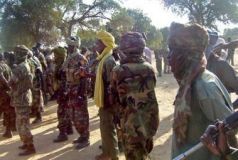Chad rebel leader demands change, by force if needed
Feb 12, 2006 (SUDAN-CHAD BORDER) — Confident and relaxed, the leader of the insurgents trying to topple the Chadian president says well-armed defectors are flocking to his remote camps on the Sudanese border and are eager to take power.
 In his first interview with a Western journalist, Mahamat Nour said his forces are now “eight times stronger” than when they attacked the Chad border town of Adre in December, a raid he describes as a test run.
In his first interview with a Western journalist, Mahamat Nour said his forces are now “eight times stronger” than when they attacked the Chad border town of Adre in December, a raid he describes as a test run.
A stocky man with a commanding presence and an organised mind, Nour, 35, comes from a family that has played a key role in making and breaking Chad’s leaders over the past two decades.
His father, the head of a powerful east Chadian tribe, helped launch both the coup that brought President Idriss Deby to power in 1990 and that of his predecessor Hissene Habre.
Many of the area’s tribes span the long and porous border, making it almost impossible to differentiate nationalities.
Nour himself is fluent in Arabic, French and his native tribal language Tama, speaking each with a slight stutter.
His desert bases are well defended. A jolting three-hour drive on dirt tracks through Sudan’s Darfur region brings the visitor to a narrow opening between two hills, where vehicles full of armed men appear from nowhere and surround the car.
From the French spoken by the men in new green uniforms, it is clear this is one of the insurgents’ camps.
Both Deby and Nour know this rocky terrain well from the days when coups were planned here. Sudan’s western Darfur region is now in the throes of its own civil war.
Nour left Deby’s government in 1994, disillusioned with what he calls Deby’s “autocratic and corrupt ways.” Since then he has remained in opposition, spending time in Khartoum and other African capitals.
FINAL CHANCE
Nour has said he has offered Deby a final chance to accept a national forum to discuss democratic change or face removal by force.
“No one wants a war, but if that’s the only way, we will go to Chad,” he said.
His ambitions have fuelled tension between Sudan and Chad and prompted Deby to declare a “state of belligerence” with Sudan, which he has accused of supporting Nour.
Last week the two states’ presidents agreed at a mini-summit in Tripoli to ban insurgents from setting up bases in each country, but the border is remote and largely unsupervised.
Nour said December’s failed attack on Adre was a test run and, with deserters arriving every day including high-level government officials, he now had thousands of troops.
Truckloads of young men and supplies, including brand new weapons, were arriving every day at the well-secured camp. Heavy weapons including rocket and mortar launchers were out of sight just beyond the deceptively simple entry checkpoint of a branch and two stones. There appeared to be no shortage of funds.
Chadian Colonel Ahmed Youssef Bishara, one of a group of senior officers who deserted recently and came to the rebel camp, said he was surprised at the strength of Nour’s forces.
“There’s not been anything as big as this in all my experience,” he said. “Here we have many heavy weapons and many troops — much more than Deby had.”
JOIN NOUR’S RANKS
Bishara said he had some 1,800 troops in southern Chad near the border and was ready to join Nour’s ranks to oust Deby.
“Deby has taken the money from the Chadian people — now we want freedom,” said Bishara, a tall, sinewy figure wearing dark glasses and green army uniform.
“We have people in the high ranks with us. When Deby is sleeping we know what he just ate for dinner,” he said with a grin.
Colonel Bishara Moussa Farid, who took part in peacekeeping operations in Rwanda and the Democratic Republic of Congo (DRC), has also turned on Deby.
“He accused me of attempting a coup and imprisoned me for six months,” said Farid, 52, a vetern who took part in the coups which installed both Deby and his predecessor Hissene Habre in power in N’Djamena.
“These troops here are much better off than the previous resistances,” he said. “We didn’t have equipment and heavy weapons as we do now,” he added.
Some members of the opposition groups that signed an agreement in December to form the United Front for Democratic Change said there were doubts over whether Nour was strong enough to unite them.
“Everywhere in the world there are problems like this,” was Nour’s reply. “But I can say that as of today, it’s all going well.”
Nour and his troops were confident of success. “We will invite you to N’Djamena when we arrive,” he said, laughing with his officers.
(Reuters)
